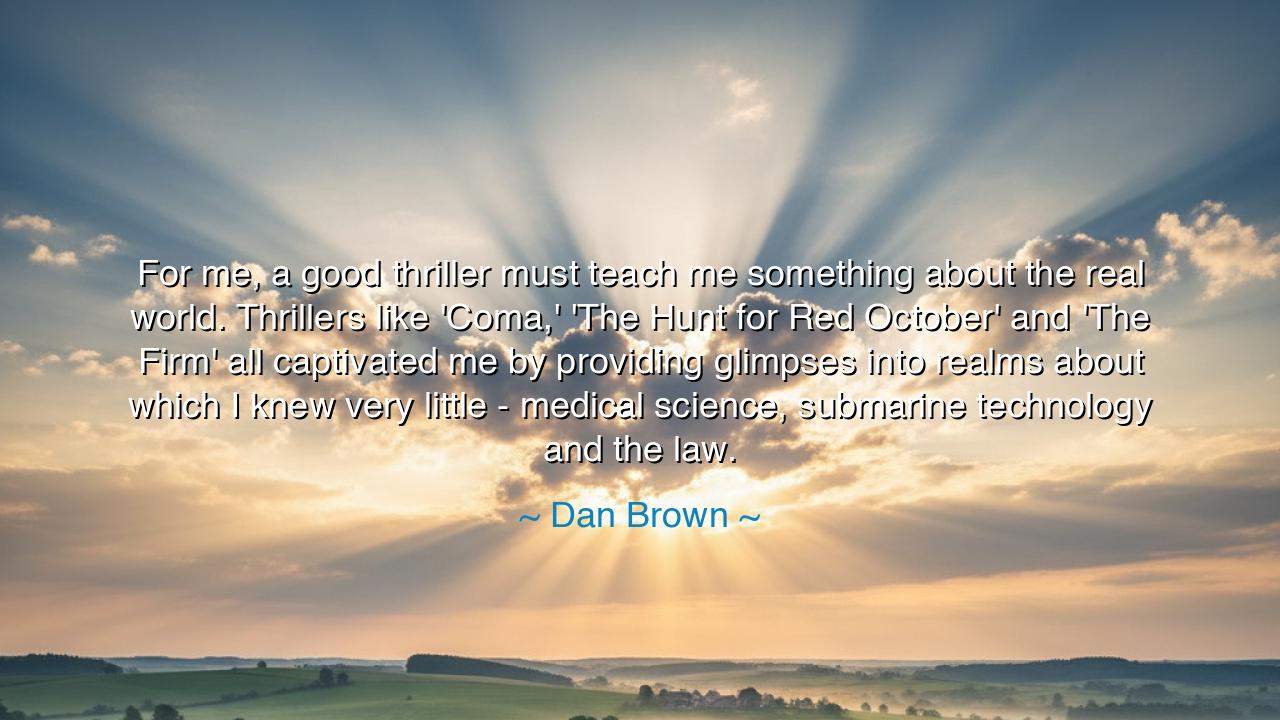
For me, a good thriller must teach me something about the real
For me, a good thriller must teach me something about the real world. Thrillers like 'Coma,' 'The Hunt for Red October' and 'The Firm' all captivated me by providing glimpses into realms about which I knew very little - medical science, submarine technology and the law.






The words of Dan Brown—“For me, a good thriller must teach me something about the real world. Thrillers like 'Coma,' 'The Hunt for Red October' and 'The Firm' all captivated me by providing glimpses into realms about which I knew very little—medical science, submarine technology, and the law”—reveal the heart of a storyteller who seeks not only to entertain but to enlighten. Beneath his reflection lies a profound truth: that knowledge and wonder are not separate pursuits, but twin pillars of the same human yearning. The best stories, he reminds us, are not merely escapes from life—they are windows into reality, showing us the hidden workings of the world and of ourselves.
Brown’s words speak to the ancient bond between wisdom and storytelling. In every age, the greatest tales have carried more than suspense—they have carried revelation. The Greeks, in their tragedies, taught the laws of fate and the perils of hubris. The philosophers of the East wrapped moral lessons in parables. The storytellers of the Middle Ages used allegory to explain theology and science alike. So too does Brown call upon that same tradition in the modern age, declaring that a tale without truth is an empty vessel. To thrill the mind without feeding it is to stir the heart only to leave it hungry. A true thriller, therefore, must awaken curiosity; it must teach the reader something real, something lasting.
The origin of his insight lies not only in his art but in his own formation. Before Dan Brown was the author of The Da Vinci Code, he was a student of music, literature, and science, fascinated by the patterns that connected art and knowledge. In this quote, he reveals what shaped his craft: that his favorite thrillers—Coma, which opened the secret world of medical ethics; The Hunt for Red October, which plunged readers into the labyrinth of Cold War technology; and The Firm, which exposed the moral tensions of corporate law—were not just tales of danger, but portals into truth. They blended excitement with enlightenment, showing that learning itself can be an adventure.
The ancients understood that curiosity is not a luxury—it is a virtue, a sacred fire that propels humanity forward. Consider the story of Eratosthenes, the Greek scholar who calculated the circumference of the Earth by measuring shadows in distant cities. His discovery began not with ambition, but with curiosity—the same impulse that drives the reader through a good thriller: the hunger to know why and how. Dan Brown’s words echo that same ancient impulse. He reminds us that the thrill of discovery in fiction mirrors the thrill of discovery in life. To learn is itself an act of heroism, for it expands the mind beyond fear, beyond ignorance, beyond the walls of the familiar.
In a deeper sense, Brown’s statement is also a lesson about connection. The world of fiction and the world of reality are not opposed—they are reflections of one another. The skilled writer uses imagination to reveal truth. In Coma, we see how science without ethics becomes horror. In The Hunt for Red October, we glimpse the silent wars waged beneath the sea—and the fragile humanity within them. In The Firm, we learn that ambition, unmoored from morality, becomes a snare. Each of these stories, while fictional, exposes truths about human nature and the world we build. Brown’s admiration for them shows his belief that stories should not merely distract us—they should arm us with understanding.
There is also humility in his reflection. When he says that these books gave him glimpses into worlds he “knew very little” about, he acknowledges the boundless expanse of knowledge and the joy of being a perpetual student. The wise know that learning never ends—that each new subject, each mystery unraveled, deepens one’s sense of awe. A true thriller, then, is a mirror of life itself: a journey from ignorance to insight, from confusion to clarity. The suspense of the story mirrors the suspense of existence, and the resolution of the plot mirrors the enlightenment of the mind.
The lesson of Dan Brown’s quote is thus one of reverence for knowledge. Let every book you read, every film you watch, every story you encounter, teach you something about the world and yourself. Seek not only entertainment, but education wrapped in wonder. Let curiosity be your compass and truth your destination. When you read, read not as a passerby, but as a traveler collecting wisdom from every realm you visit.
So, my child, when you next open a story or craft one of your own, remember the wisdom of Dan Brown. A story that does not teach is like a meal without nourishment—it fills for a moment but leaves the soul empty. The best tales, like the best lives, unite thrill and truth, heart and intellect, art and understanding. Seek stories that broaden your mind, challenge your beliefs, and remind you that learning itself is the grandest adventure of all. For in the pursuit of knowledge—whether through books, discovery, or imagination—you walk the path of the ancients, and your spirit joins the eternal quest to know the mysteries of the world.






AAdministratorAdministrator
Welcome, honored guests. Please leave a comment, we will respond soon